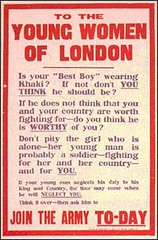"Newsbusters" way of lamely defending the indefensible is to focus on the content of the President's speech. "Since the media don't reprint excerpts of the speech nor give readers the links to the original source material, here are some comments from May 1, 2003, that point to President Bush warning Americans of an ongoing struggle to establish Iraqi democracy and counter the threat of terrorism . . ." The theory, I guess, being that if one examines the president's words on that day, he would get the impression that the president was preparing the country for the difficult struggle that lay ahead. The notion is absurd--if the president had wanted Americans to focus on his words, he would have made an address from the Oval Office instead of on a carrier. The excerpts from the speech that Ken Sheperd chose can't carry the weight that he places upon them:
We have difficult work to do in Iraq. We're bringing order to parts of that country that remain dangerous. We're pursuing and finding leaders of the old regime, who will be held to account for their crimes. We've begun the search for hidden chemical and biological weapons and already know of hundreds of sites that will be investigated. We're helping to rebuild Iraq, where the dictator built palaces for himself, instead of hospitals and schools. And we will stand with the new leaders of Iraq as they establish a government of, by, and for the Iraqi people. (Applause.) . . .
Sure, he was saying that the war wasn't completely over, but the passage above speaks of a minor mopping-up operation. Elsewhere in the speech, the President spoke of the war in the past tense:
This nation thanks all of the members of our coalition who joined in a noble cause. We thank the Armed Forces of the United Kingdom, Australia, and Poland, who shared in the hardships of war. . . (emphasis added)
He obviously wasn't preparing for a long hard slog at this point, he was celebrating a victory-- a "Mission Accomplished." If Bush had wanted to prepare the country for what lay ahead, he might have said something along these lines:
My Fellow Americans,
We have toppled Saddam's regime but most of the hard work of occupation lay ahead. To quote one observer, ". . . then the tide recedes, for the one endeavor at which Islamic peoples excel is expelling imperial powers by terror and guerrilla war." In the coming months and years thousands more Americans will be killed and maimed by roadside bombs and anonymous snipers. It will be difficult to tell friend from foe. As tragic as the loss of life for Americans will be, the suffering of our friends, the newly liberated Iraqis will be unimaginably greater. I can't predict how many Iraqis will be butchered in the coming war, but it will be in the tens of thousands . . . Imagine that 9/11 style carnage occurred on a regular basis--that is what lay in store for Iraqis.
To our brave soldiers and marines, I say this: You will become strangers to your families because of repeated rotations back to the war zone . . . When wounded you will be cared for in substandard Army hospitals . . .
